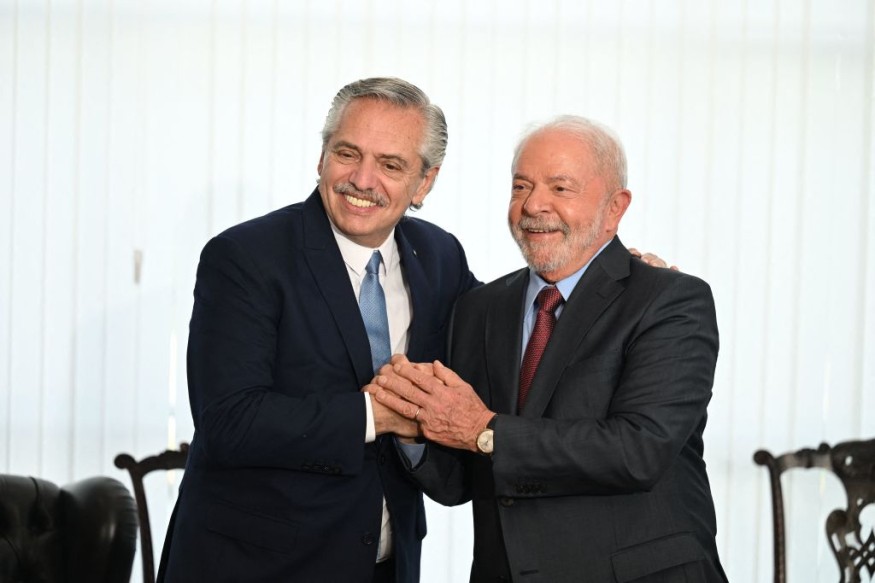Brazil, Argentina Talk About Common Currency for Greater Economic Integration

In a joint article, Brazil President Lula da Silva and Argentina President Alberto Fernandez expressed their desire for deeper economic ties between their countries, including creating a common currency, according to U.S. News.
"We intend to overcome the barriers to our exchanges, simplify and modernize the rules and encourage the use of local currencies," says the text published on the Argentine website Perfil.
Lula brought up the concept of a common currency during his campaign, which was first proposed in an article written last year by Fernando Haddad and Gabriel Galipolo, who are now Brazil's finance minister and his executive secretary, respectively.
Following precedent, Lula went to Brazil's largest regional commercial partner, Argentina, for his first abroad trip as president, after four years of tension under Jair Bolsonaro, Brazil's right-wing former president.
By visiting Argentina, Lula is also signaling Brazil's return to the Community of Latin American and Caribbean States (CELAC), which Brazil quit in 2019 at Bolsonaro's behest because of the presence of Cuba and Venezuela.
The article states that both presidents recognized the importance of maintaining positive relations between their countries to advance regional integration.
READ NEXT : Brazil Ministry of the Economy Disputes
The Proposal Comes Amids Argentina's Battle with Inflation
This latest proposal comes when many emerging nations are looking for alternatives to the strong U.S. currency, and Argentina is experiencing its greatest inflation over three decades.
Meanwhile, Brazil's economy is forecast to grow slowly this year, and the new government of President Lula intends to increase public spending to fulfill his campaign promises considerably, said Bloomberg.
A Brazilian government representative claims that Argentina was the one who first proposed the talks.
The talks are in their preliminary stages, and the official, who requested anonymity because of the topic's sensitive nature, confirmed that there is no set timeframe for their conclusion.
However, a message left with Argentina's presidential spokeswoman after business hours went unanswered.
Argentina is attempting to "boost trade, which is falling a lot," Brazilian Finance Minister Fernando Haddad told reporters in Buenos Aires.
One possibility is using a common currency for all financial and business dealings.
"We're analyzing many possibilities," Haddad said. "Something that allows us to increase trade because Argentina is one of the countries that buys manufactured goods from Brazil, and our exports here are falling."
Brazil, Argentina Will Also Offer the Project to Other Nations
The program would start as a bilateral project but then be made available to other countries in Latin America.
According to the Argentine minister. "it is Argentina and Brazil inviting the rest of the region."
A currency union covering all Latin America would amount to around 5% of global GDP, according to Financial Times estimates.
About 14% of global GDP is exchanged within the Eurozone, making it the largest currency union in the world.
Some African countries utilize the CFA franc, linked to the euro, and the East Caribbean dollar is another common currency.
However, they account for a significantly smaller percentage of the world's GDP.
Expect the project to take a long time to complete; Massa pointed out that it took Europe 35 years to construct the euro.
On Sunday night, Brazilian President Lula da Silva will embark on his first international trip since assuming office on January 1. While in Argentina, he is anticipated to make the news officially.
A common currency between Brazil and Argentina has been explored recently.
However, the proposal has stalled due to resistance from Brazil's central bank, according to a person briefed on the matter.
There is more political support now that left-wing presidents lead both countries.
READ MORE : Lisa Marie Presley's Memorial Service
This article is owned by Latin Post.
Written by: Bert Hoover
WATCH: WHY Argentina and Brazil are Creating a Common Currency - From CounterExam
Subscribe to Latin Post!
Sign up for our free newsletter for the Latest coverage!
© 2026 Latin Post. All rights reserved. Do not reproduce without permission.











